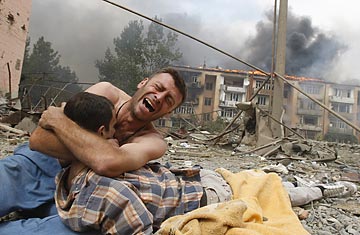
A Georgian man cries near the body of a relative after a bombardment in Gori, 50 miles (80 km) from Tbilisi, on Aug. 9, 2008
After last year's war between Russia and Georgia, which left at least 250 people dead and parts of Georgia in ruin, each country was eager to point the finger of blame at the other for starting the conflict. On Wednesday, an independent investigating team issued a highly anticipated report saying that neither country can escape fault.
In the 1,100-page report, the investigators say Georgia fired the first shots in the August 2008 conflict when it launched an attack on the breakaway region of South Ossetia, which the team deemed "unjustifiable" under international law. But the report, which was sponsored by the European Union, says the attack followed months of Russian provocation, including a heavy military buildup in the region and increased support for separatist movements in both South Ossetia and Abkhazia, another breakaway region of Georgia.
The report was written over nine months by Heidi Tagliavini, a Swiss diplomat leading the inquiry, with the help of 19 European military, legal and history experts tasked with investigating the "causes and roots" of the conflict. The war lasted just five days: Russian forces quickly repelled the Georgian assault and advanced deep into Georgian territory, pulling back only when a cease-fire was brokered. Yet soldiers remain on the border between the two countries to this day, and tensions have not subsided.
The inquiry says the conflict started the moment Georgia shelled the South Ossetian capital of Tskhinvali on the night of Aug. 7-8, 2008. "In the mission's view, it was Georgia which triggered off the war when it attacked Tskhinvali with heavy artillery," Tagliavini said in a statement accompanying the report. The document condemns the bombing, saying it was an overly aggressive response to the provocation. "It is not possible to accept that the shelling of Tskhinvali ... would satisfy the requirements of having been necessary and proportionate in order to defend those villages," it says.
Russian officials were quick to claim that the report cleared them of culpability. "Who started the war? On that question the report gives an unequivocal answer," says Vladimir Chizhov, Russia's ambassador to the E.U.
But Russia received its fair share of blame. The attack by Georgia was "the culminating point of a long period of increasing tensions, provocations and incidents," the report says. In the run-up to the war, Russia issued passports to South Ossetian citizens, which the investigators say "runs against the principles of good neighborliness and constitutes an open challenge to Georgian sovereignty and an interference in the internal affairs of Georgia." More ominously, the report notes that there seemed to be an "influx of volunteers or mercenaries" from Russia to South Ossetia in early August 2008.
The inquiry rejects outright the Russian allegations that Georgia had carried out a genocide against the South Ossetian population, but it accepts Tbilisi's charges that ethnic cleansing took place against Georgians driven from South Ossetia in the conflict.
Georgia said the investigation proved that Russia had been preparing for war all along. "We are glad that almost all the facts we have alleged have been confirmed, in particular that armed Russian units entered Georgia before August 7," says Salome Samadashvili, Georgia's ambassador to the E.U. "The report confirmed that Russia committed an act of aggression against a sovereign state, thus breaking the U.N. charter."
Beyond Tbilisi and Moscow, the report was welcomed as a basis for both sides to start anew. Ulrike Lunacek, an Austrian member of the European Parliament who sits on a committee focused on Georgian affairs, says it is important to look beyond mere finger-pointing. "It is not helpful to start a blame game — both sides played their role and share the blame. And both sides need to do something to resolve the issue," she says.
But Lawrence Sheets, Caucasus project director of the nonprofit organization Crisis Group, is skeptical about whether the report will change anything. "Russia has firmly re-established its geopolitical position in the region, so there is almost no prospect of Georgian reunification," he says. Since the cease-fire, Russian troops have effectively sealed the border between South Ossetia and the rest of Georgia, and increased their military presence in both South Ossetia and Abkhazia. But while Moscow has recognized South Ossetia and Abkhazia as independent nations, only Nicaragua and Venezuela have followed suit.
In Georgia, President Mikheil Saakashvili, once considered a champion of democracy in the region, has seen his stature fall at home and abroad since the conflict. However, street protests in April failed to topple him, and he still has friends in high places: the Obama Administration. Vice President Joe Biden visited Tbilisi in July and pledged continued U.S. support for efforts by Georgia and Ukraine to break free of Russia's orbit.
The authors of the report note that the security situation in the region has not improved. "Though both sides stress their commitment to a peaceful future, the risk of a new confrontation remains serious," the document reads. If the reactions of Georgia and Russia to the inquiry's findings are anything to go by, whatever lessons the report holds may well be lost.
Download the new TIME iPhone app at app.time.com.
